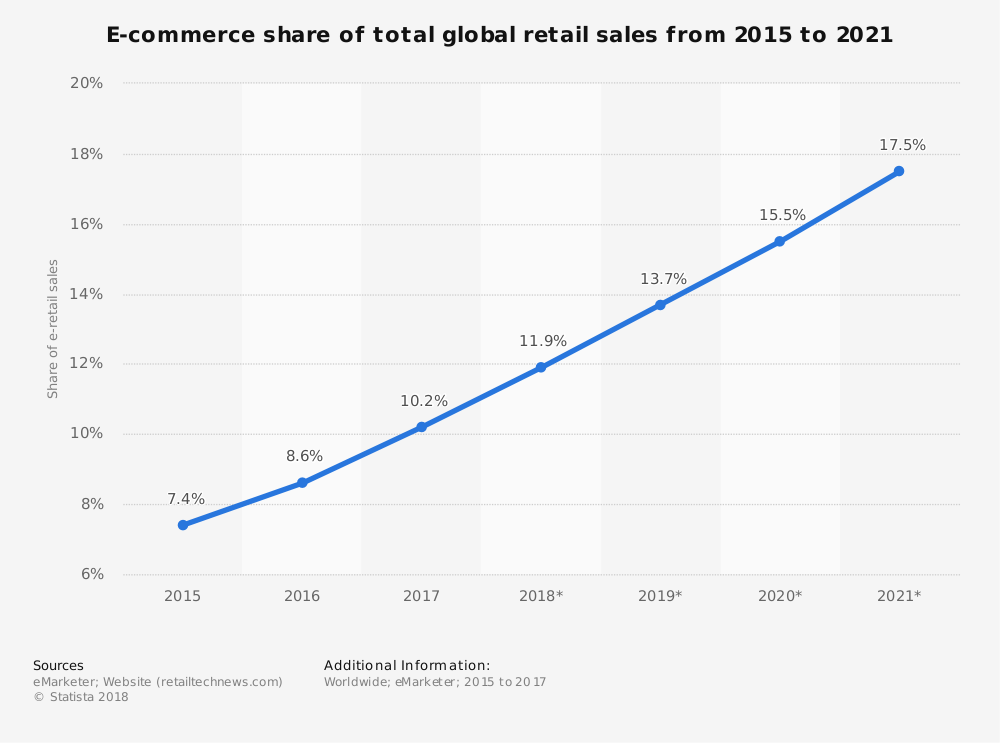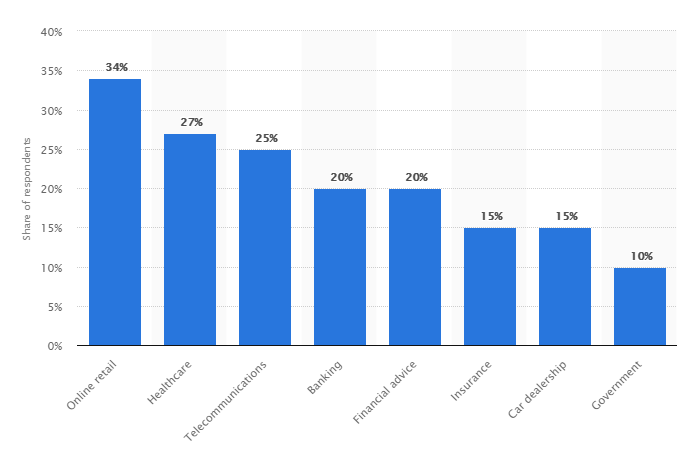
Selling goods online is just not a new fad. It is one of the most recent successful business ideas that have done wonders across the globe. A few tap or clicks and users have the things they want – at their doorsteps in a couple of days. And on the other hand, entrepreneurs are racing to further enhance users’ shopping experience by leveraging the technology.
There’s a reason why businesses are always looking for detailed improvement. Because, as per Statista, eCommerce is expected to contribute around 14% of the total sales in 2019, globally with a possibility of reaching 17.5% by 2021.

Keeping websites and apps close to reality will require adopting and implementing a certain set of technology and this how you can do it.
It is something that any scalable eCommerce business should aim for. The key to improve sales and engage customers for a longer run, you’ll need to personalize their buying experience. One of the ways is to equip the right tools to avail detailed customer information. This includes demographics, age, interests, their historical purchases and analysis of their buying behaviour. This will help to gauge their interests to the target audience for remarketing. Also, it lets users set the right expectations from a seller. It will set the tone of communication and designing campaigns around what they see when they land on your web site or see your ad on social media.
Buyers don’t shop blindly nowadays, and never did they before. They make a purchase decision only after thorough research and reading reviews about the products. That is why eCommerce entrepreneurs should focus more on bettering the product descriptions. Also, providing association story is the key to making the customer feel a strong connection with the brand. See how March Tee is telling stories for selling plain, solid T-shirts online.
While poor product description and missing out on crucial details may turn off the customers, big time. To an extent that they won’t be even looking for a review at first place. Such loopholes are the primary reason why 40% of the apparel bought online is returned by the users. Here, you’ll end up wasting more time and money while also creating a lot of operational hassles to fit back the returned product in the selling line. Start telling a better, crisp and precise story to precisely communicate what the product is all about.
Think of an eCommerce store where a virtual salesperson welcomes your prospective buyer? This is how you can replicate the brick & mortar scenario by bridging the gap between real and online store. The benefit of using AI for eCommerce is that you can assign the same amount of task as human and it can handle it efficiently, minus the manual errors. This can get extended to handle complex tasks like taking up multiple inquiries and managing the product inventory. Practically, these are digital assistants that free your time and utilise it to running your business better.
Chatbots for that matter makes up for an ideal choice to cater to customer needs. It can process all the required information to assist the customer with product details and also managing multiple complaints. Moreover, because of machine learning, it can enhance itself based on conversations with the customers. Chatbots can thus evolve with time to provide a personalised customer experience in a longer run. Currently, 34% of online retail businesses develop Chatbots which makes it a successful choice to go with for the eCommerce entrepreneurs.

Source: Statista
Industry experts predict, 80% of businesses will be using chatbots by 2020
Next step is to find a more way to engage chatbots for lead conversion since it can only address the concerns inside its set and programmed parameters.
With people glued to mobile more than the laptops and desktop, eCommerce business’ presence needs to be device-agnostic. Around, 40% of eCommerce purchases in holiday season was made through mobile devices.
A retail eCommerce business needs to evolve beyond the just website to widen its reach. The difference in screen sizes across the various device is already pushing entrepreneurs to have a website that is displayed in the same way across all devices – be it desktop or a smartphone. The ideal solution for this sit to go for the custom website designs blended with responsive techniques. Such a Responsive website design will get your website to adapt to multiple screen sizes. Another alternative is to design and publish the mobile app to create an exclusive app-buying experience for the customers with ecommerce website cost that wont put hole in your pocket.
We are here to help you build your online store and scale up your business performance. If you looking to develop an eCommerce website or mobile application, consult our experts for tailored eCommerce solutions.
Talk to our Experts Now!Every buyer will indeed think twice before actually transacting for the purchase. They have doubts about whether the product will exactly be the same as shown in images/videos. Also, they may be curious about their quality. Here, the businesses will need to go beyond just the reviews and influencers’ opinion. Instead, efforts should be made to replicate the ‘touch and feel’ aspect of retail business which customers are deprived of when buying online.

This is where one could leverage virtual reality, augmented reality, and 3D imaging to give more ways to people for interacting with the product. See how LensKart uses 3D to let customer see how a particular piece of eyewear will look on them. Next step is to move one from that old-school infomercial and offer a 360-degree online shopping experience. Roping in such interactive product visualisation technology is one step closer towards bridging the in-store experience to the customers buying products online.
What’s next in eCommerce?
Technology and resources are there at entrepreneurs’ disposal. The key is to find the best-suited technology that compliments the product offerings. For example, jewellery and dress retailers may use 3D visualisation but travel eCommerce business may find telling stories an ideal match.
It all boils down the customer experience in eCommerce. Anything that engages customers, retain them and keep them coming for more will be the best bet.